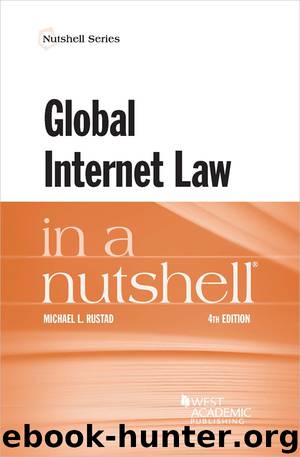Global Internet Law in a Nutshell by Michael L. Rustad

Author:Michael L. Rustad
Language: eng
Format: epub
ISBN: 9781684671281
Publisher: West Academic
Published: 2019-03-13T16:00:00+00:00
(A)Criminal Law Provisions
The most important federal statute used to prosecute cybercrime is the Computer Fraud and Abuse Act (CFAA) which punishes and deters computer hackers, e.g., ‘electronic trespassers.’ 18 225
U.S.C. § 1030. The CFAA prohibits accessing a computer without authorization, or in excess of authorization.
As Internet-related computer crimes evolved, Congress amended the CFAA. The USA Patriot Act “address[ed] situations where an attacker within the United States attacks a computer system located abroad and situations in which individuals in foreign countries route communications through the United States as they hack from one foreign country to another.”
Computer Crime and Intellectual Property Section Criminal Division, Prosecuting Computer Crimes (2017) at 5.
The CFAA penalizes the act of accessing a protected computer to steal national security information. The term “protected computer,” 18 U.S.C. § 1030(e)(2), is a statutory term of art that covers computers used in or affecting interstate or foreign commerce and computers used by the federal government and financial institutions. The computer must be “used in or affecting interstate or foreign commerce or communication.” This definition covers all computers connected to the Internet.
The USA Patriot Act amended the CFAA to “address situations where an attacker within the United States attacks a computer system located abroad and situations in which individuals in foreign countries route communications through the United States as they hack from one foreign country to another.”
226
Computer Crime and Intellectual Property Section Criminal Division, Prosecuting Computer Crimes (2017) at 5.
The CFAA penalizes the act of accessing a computer to misappropriate national security information. The computer must be “used in or affecting interstate or foreign commerce or communication.” The CFAA applies to “protected computers” that in practice is all computers connected to the Internet. The 2008 amendments to the CFAA made the following changes in response to evolving cybercrimes:
Eliminated the requirement in 18 U.S.C. § 1030(a)(2)(C) that information must have been stolen through an interstate or foreign communication, thereby expanding jurisdiction for cases involving theft of information from computers;
Download
This site does not store any files on its server. We only index and link to content provided by other sites. Please contact the content providers to delete copyright contents if any and email us, we'll remove relevant links or contents immediately.
Mastering Bitcoin: Programming the Open Blockchain by Andreas M. Antonopoulos(2525)
Dawn of the New Everything by Jaron Lanier(2446)
Blockchain: Ultimate Step By Step Guide To Understanding Blockchain Technology, Bitcoin Creation, and the future of Money (Novice to Expert) by Keizer Söze(2146)
Alibaba by Duncan Clark(1760)
Owning Bitcoin: The Illustrated Guide to Security, Privacy, and Potential by Apodaca Richard(1722)
Foundations of Blockchain by Koshik Raj(1658)
Significant Zero by Walt Williams(1637)
The Mastermind by Evan Ratliff(1602)
Bitcoin: The Basics of Blockchain and Investing in Cryptocurrency by K. Connors(1567)
Mastering Blockchain by Imran Bashir(1442)
Attack of the 50 Foot Blockchain by David Gerard(1434)
Bitcoin: The Ultimate Guide to the World of Bitcoin, Bitcoin Mining, Bitcoin Investing, Blockchain Technology, Cryptocurrency (2nd Edition) by Ikuya Takashima(1426)
The Bitcoin Standard: The Decentralized Alternative to Central Banking by Saifedean Ammous(1426)
Shaping the Fourth Industrial Revolution by Klaus Schwab & Nicholas Davis & Satya Nadella(1362)
Dawn of the New Everything: Encounters with Reality and Virtual Reality by Jaron Lanier(1339)
Turing's Cathedral by George Dyson(1331)
Cryptocurrency by Neil Hoffman(1330)
The Bitcoin Guidebook by Ian DeMartino(1296)
Bill Gates by Michael Becraft(1268)
